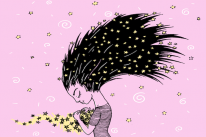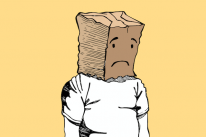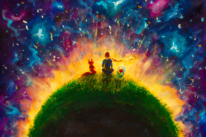
“We can easily forgive a child who is afraid of the dark; the real tragedy of life is when adults are afraid of the light.” ~Adapted from Plato
I was digging in my half-empty refrigerator one day, searching for leftovers, when my phone rang. I glared at it wondering who the hell had the nerve to interrupt my hunt for sustenance.
I grabbed the phone with pure agitation and put it to my ear. On the other end of the line I heard a faint voice mutter the three most unforgettable words I had ever heard: “Dad is gone.”
The faint voice belonged to my stepmom Rose. She told me that dad was headed for surgery that morning when he had a massive heart attack. She said that he sprang up in bed and reached out to her with his eyes stretched open in terror. And that was it. He was gone.
As an anxious twenty-two-year-old, suffering wasn’t new to me, but this was different. It wasn’t long after my dad died that I spiraled into daily panic attacks and became a whimpering victim of anxiety.
We all encounter fear sometimes—it’s normal. But I did it all wrong. I let it control my life. After my dad passed away, my days were usually filled with uncertainty, self-doubt, and misery.
I later wondered if the same fate awaited me, to the point where I developed all kinds of phobias: health phobia, social phobia, and a crushing fear of death. I was truly lost.
Fear became my new normal. I allowed my negative thoughts to shape my reality. I stopped believing in myself, in other people, in the future; all of it seemed meaningless.
Over the years I struggled to tame my fears, and if I’m being totally honest, on some days I still struggle. The good news is that I don’t stay stuck like I used to.
I’ve learned to understand my fears for what they really are, rather than what I imagine them to be. And I live with less fear every day because of seven rock solid tips that I learned after losing my dad.
1. Relax.
When we are fearful, we get tense without even knowing it. Learning how to let go of tension was a key factor in my recovery from fear and anxiety.
I learned progressive muscle relaxation exercises and practiced daily. I learned that making peace with your body is a great way to make peace with your mind.
2. Find your inner observer.
I had no idea that I had one, but there is a part of the mind that is able to observe thoughts without judgment or expectation. Getting in touch with your inner observer weakens the power of fear and reduces “what if” thinking.
Meditation is hands down one of the best ways to train yourself to identify and strengthen this part of your mind.
3. Reframe.
Words are powerful. The ones you use to describe life and all its challenges will not change what happens to you, but it can change how you feel about it.
Instead of obsessing over my “palpitations,” I reframed this as “I’m nervous.” Reframing helped me to form positive perspectives about all kinds of stuff.
4. Be mindful.
When I was really anxious I lived in the past or the future. I totally forgot about living my life in the present. Take the time to enjoy today.
5. Connect.
Fear has a way of isolating us from ourselves and others. But it’s important to remember that connecting with other people is a vital part of a healthy life. Reach out!
6. Challenge your fears.
Do you want to know how absurd fear can be? I used to fear soft drinks! Well, actually, I was afraid of caffeine, but seriously. Challenging your fears builds self-confidence and over time ensures that you get to live the full version of your life.
7. Be kind to yourself.
There is a 100% chance that things won’t always go your way, including being afraid when you don’t want to be. Don’t punish yourself for being “stupid” or “weak,” though. It’s okay to be afraid sometimes. The question is: What are you going to do when fear comes to your doorstep?
When I’d get anxious, it was because I didn’t believe that I had what I needed to be okay. But the truth is that we all do—somehow, someway, we always do.
And therein lies the “secret” to living with less fear: the realization that you do have the means to weather any storm. That you are stronger than you give yourself credit for.
Peaceful man image via Shutterstock
About Paul Dooley
Paul is a blogger and producer of the podcast The Anxiety Guru Show. You can follow his blog and podcast at anxietyguru.net. Paul has been dedicated to working with people that struggle with anxiety and depression since 2008.













 Though I run this site, it is not mine. It's ours. It's not about me. It's about us. Your stories and your wisdom are just as meaningful as mine.
Though I run this site, it is not mine. It's ours. It's not about me. It's about us. Your stories and your wisdom are just as meaningful as mine.
Thanks Paul for that great post. I read it and it took me back to August 8th 1992 when my beloved grandmother past away that same way. As I read your story I remembered where I was and what I was doing when my life changed. I went through the same struggles you went through and like you still have my moments but what has kept me going on most days are those wonderful memories of my precious grandmother who I loved more than anything in the world. When I feel anxious, afraid, lonely, sad or depressed I would remember her and allowing her to speak to my spirit as only she could.
I have to learn to challenge my fears as I am someone who is always fearful that the worse thing will happen. Life can sometimes be a bit hard but I have learned to take it as it comes. Thanks again for that great post.
Thanks for the post, Paul. I struggled with anxiety most of my life and the most useful thing I found to manage it has been meditation and mindfulness. I was amazed at how well they both worked.
I love your quote at the end of this post. “And therein lies the “secret” to living with less fear: the realization
that you do have the means to weather any storm. That you are stronger
than you give yourself credit for.” I think this is true for most people, but especially true for people who suffer from anxiety issues.
Hey Lovelyn, I totally agree. Learning how to relax and be in the moment is a crucial part of lowering anxiety. And like you pointed out, there’s something about living with anxiety that builds up tolerance of adversity and ambiguity that really comes in handy when life gets hard. Glad you enjoyed the post.
Hey Rose, I can relate to that. On my bad days I always try to imagine what my dad might say about a tough situation if he were still around. Usually what I come up with is pretty funny and sometimes even helpful.
Paul, this was a very powerful read – thank you for sharing it.
I find that fears shrink when we write them out – making them external has an interesting shift in that they are now in the open. They can also be shared and reduced in this fashion.
I also find that morning is the best time to face them, when I am alert, rested and fresh both mentally and physically. If I am thinking about fears at night, I attempt to put a book mark in it and re-visit in the am.
This helps me profoundly, since I am like everyone else – I face fears every day and sometimes less successfully than other days.
As a student of self talk and learning, I find these conversations to be hugely helpful.
Thanks again for the share.
Hi Eric, you’re 100% right. Funny how that works. When you speak or write out your inner thoughts it does tend to change how you think about your struggles. I especially like that you have a time of day to do your thinking/worrying. Get it out of the way and focus on the day at hand!
I too have dealt with panic attacks.
They controlled so much of my life and stolen so much from me. I have since cured myself of them. I havent had one in over 10 years
Whenever I come across someone who says they have them, or reaches out for advice, I tell them how I did it. This is usually through comments sections such as this. I have yet to even have a reply, let alone any feedback. I wish people would take me seriously, because what I have done really works. My first panic attack lasted over a month, so I do know what I am talking about.
Ps. I wad afraid of caffeine too
Do share Lisa
Loved the post, Paul. I’m a big fan of your blog. Hope you’re doing well!
Thanks for sharing Paul. I appreciate your honest and clear points which I and I’m sure also others can relate to and learn from.
Thank you Paul. This helped me today. xo